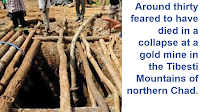An outbreak of Hepatitis E has resulted in seven deaths and over 2000 people becoming sick in Ouaddai Province, Chad, according to a press release issued by the World Health Organization on 8 May 2024. The outbreak was first detected on 2 January 2024 when to cases of Acute Jaundice Syndrome were reported by medics from Médecins Sans Frontières who were operating a clinic at a temporary high school at a refugee camp in the Adré Health District of Ouaddai Province.
Between 2 January and 15 February 2024 the number of reported cases of Acute Jaundice Syndrome in Adré Health District rose to 113, of which 28 were confirmed as being Hepatitis E using rapid diagnostic test kits. On 19 February a case was reported at the Allasha Refugee Camp in the Hadjer-Hadid Health District, also Ouaddai Province.
Between 1 and 19 March 2024 forty blood samples taken from Acute Jaundice Syndrome sufferers in Ouaddai Province were sent to the Institute Pasteur of Dakar, Sénégal, where they were tested for Hepatitis E, Yellow Fever, Dengue, West Nile Fever, Zika, Chikungunya, Rift Valley Fever and Crimean-Congo Haemorrhagic Fever. Of these, 36 tested positive for Hepatitis E.
Between 2 January and 28 April 2024 a total of 2092 suspected cases of Hepatitis E were reported in Ouaddai Province, with seven fatalities. One hundred and three of these cases were members of the local conflict, while the remaining 1989 were refugees from the conflict in neighbouring Sudan, with the Lycée d'Adré, Aboutengué, and Metché refugee camps being particularly badly hit.
Hepatitis E is caused by a single-stranded, nonenveloped, RNA Virus, and is usually a self-limiting infection, causing fever, nausea, loss of appetite, vomiting, jaundice, abdominal and joint pain and discolouration of the urine and stool, which typically passes within 2-6 weeks. However, in some cases the disease can cause acute liver failure (hepatitis) which is often fatal. Pregnant women are considered to be at particular risk from this disease, with a fatality rate of about 30%, compared to about 1% for the general population.
Hepatitis E is spread through faeces and contaminated water, and thrives in unsanitary and crowded conditions. This makes it a particular problem in settings like refugee camps, where large numbers of people fleeing conflict situations arrive over short periods of time, overwhelming local sanitation systems.
See also...











%20(1).png)